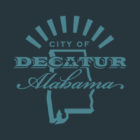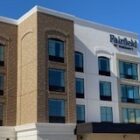State Ordinance on Facial Coverings/Masks Effective Thursday, July 16, 2020, at 5:00 P.M.
The Decatur City Council voted to pass and the mayor signed Ordinance No. 20-4419A regulating the wearing of facial coverings/masks for public health and safety. View the official ordinance (pdf).
ORDINANCE NO. 20-4419A
WHEREAS, Decatur/Morgan County has seen a significant spike in the number of COVID-19 cases over the past few weeks;
WHEREAS, there is a continued need for residents to protect themselves and others from risk relating to the COVID-19 virus;
WHEREAS, there is a continued need for businesses to remain open and safe for their patrons and employees;
WHEREAS, the City Council recognizes the possibility and the need to avoid another shutdown of our economy; and
WHEREAS, Decatur/Morgan County has experienced a spike in the number of cases of COV-19 at a level which is higher than most Alabama Counties; and
WHEREAS, after weighing the available information, consulting with the Alabama Department of Public Health and other healthcare professionals and seeking guidance from residents and business owners, the City Council concludes that the safety of the citizens and the economy is best protected by all residents and visitors wearing facial coverings/masks in public, sanitizing hands and practicing social physical distancing,
THEREFORE, BE IT ORDAINED BY THE CITY COUNCIL OF THE CITY OF
DECATUR, ALABAMA as follows:
Section 1. That the following Emergency Health Order, as authorized by State Law including but not limited to Section 11-47-131 and Sections 31-9-1, et. Seq. of the Code of Alabama 1975 and acknowledged by the Alabama Department of Public Health, is adopted reading as follows:
“It is Ordered that the following Face Covering/Mask Order be implemented in the corporate limits of the City of Decatur, Alabama effective at 5:00 p.m. on the day following its publication date:
I. Definitions. The definitions used in this Order are as follows:
Face Covering/ Mask: A device to cover the nose and mouth of a person to impede the spread of saliva or other fluids during speaking, coughing, sneezing, or other intentional or involuntary action. Medical-grade masks are not required and are, in fact, discouraged for use under this Order, as they are in short supply and should generally be reserved for high-risk first responders and healthcare workers or those coming into direct contact with suspected COVID-19 patients.
Coverings may be fashioned from scarves, bandanas, or other suitable fabrics. The face covering must cover the mouth and nose of the wearer. Reusable face coverings or masks must be kept clean and sanitary.
2. Face Coverings Required in Public Places. All persons shall be required to wear face coverings or masks in the following public places within the City Corporate Limits:
a. Indoor spaces of businesses or venues open to the general public, including but not limited to stores, bars and restaurants (see exception 3b), entertainment venues, public meeting spaces, city government buildings, civic centers, etc.
b. Transportation services available to the general public, including mass transit, paratransit, taxi, or ride-sharing services.
c. Outdoor areas open to the general public where ten or more persons are gathered and unable to maintain a distance of six (6) or more feet between persons not from the same house hold.
3. Exceptions. A face covering or mask shall not be required for:
a. Children two (2) years of age and under. Face coverings or masks may pose a risk of choking, strangulation, or suffocation to infants and young toddlers. Carriers and strollers with covers that allow the child to breathe comfortably are recommended as safe alternatives.
b. Eating or Drinking. Persons may remove face coverings while eating or drinking, provided that they re-cover their faces when interacting with other persons not at their tables such as bartenders, servers, or other customers.
c. Medical Examinations or Procedures. Patients in examination rooms of medical offices, dentist offices, clinics, or hospitals where there is a necessity to examine or treat the mouth or nasal area. In those circumstances, medical or dental professionals in charge of the office, clinic, or hospital may direct individuals to remove their face coverings.
d. Hair Care Services. A customer’s face covering may be temporarily removed or displaced when necessary to provide hair care. Otherwise, customers and workers in hair care settings must wear face coverings while inside the hair care establishment.
e. Personal Safety. A face covering or mask shall not be required when wearing such a face covering or mask poses a greater mental or physical health, safety, or security risk, such as when a person has a respiratory disease or condition, has trouble breathing, has a mental disability, is unconscious, is incapacitated, or is unable to remove the face covering without assistance . Under this subsection, a “safety risk” includes external factors, such as:
(i) persons are working on ladders or at height
(ii) persons are wearing other respiratory protection
(iii) persons are engaging in heavy physical exertion
(iv) persons are operating heavy equipment
(v) persons are working in an environment where a face covering or mask hinders communications necessary for safe10ty.
f. Places of Worship. Places of worship may use their own discretion regarding face covering requirements. However, face coverings are strongly encouraged for congregants during worship services, especially while singing or speaking together. Face coverings are also recommended for situations within places of worship where people from different households are unable to or unlikely to maintain a distance of six (6) feet from each other.
g. Effective Communication: The requirement to wear a face covering shall not apply when a person who is hearing-impaired needs to see the mouth of someone wearing a face covering to communicate. It shall also not apply to a person speaking to a large group of people, where the face covering may make it difficult for others to understand the speaker, provided the speaker can stay at least 6 feet away from other persons.
h. Indoor Athletic Facilities. All indoor athletics facilities (including fitness centers, commercial gyms and spas, as well as yoga, barre, and spin facilities) shall comply with the State Health Officer’s June 30, 2020 Order and any subsequent such Orders. Patrons are not required to wear face coverings or masks while actively participating in permitted athletic activities. However, employees in regular interaction with patrons are required to wear face coverings or masks.
i. Private Clubs and Gatherings. Face coverings shall not be required in meetings of private clubs or private organizations, provided:
(i) the meetings are not open to the general public; and
(ii) a consistent six-foot distance between persons from different households is maintained.
j. Voting Centers. A person is not required to wear a facial covering or mask during the time they are exercising their right to vote inside a voting center. Voters are strongly encouraged to wear a facial covering or mask inside the voting center. However, a voter will in nowise be prohibited from voting because of their failure to wear a facial covering or mask.
4. Children. Parents, guardians, and caregivers are responsible for ensuring the proper masking of children over the age of two years when in public places. They must also ensure that the face covering or mask does not pose a choking hazard for children and can be safely worn without obstructing a child’s ability to breathe.
a. Discretion for Young Children. Parents, guardians, and caregivers of children between the ages of over two (2) years old and eight (8) years old shall exercise their own discretion regarding the ability of those children to consistently and effectively wear a face covering or mask.
b. Childcare establishments and School s. All schools, daycares, and other childcare establishments shall develop their face covering policies and procedures based on guidance and recommendations from public health authorities and the State Department of Education. These policies should weigh the risks and benefits of masks to children, teachers, and other school employees. Parents and guardians should be notified of such policies and procedures. Where the consistent use of face coverings or masks is not possible due to the supervision of multiple children, the facility shall adhere to sanitary, hygienic, and face covering practices to the maximum extent practicable.
5. Businesses. Unless otherwise ordered by the State Health Officer to comply with a stricter face covering requirement, business owners, managers, and supervisors shall develop their own policies and procedures regarding face coverings or masks for employees in accordance with the Centers for Disease Control and Alabama Department of Public Health guidance.
a. Public Places. If a business contains a space or spaces open to the general public, policies regarding those spaces must comply with the restrictions in Section 2 of this Order.
b. Non-Public Places. If a business contains a space or spaces not open to the general public, a “non-public place” not included in Section 2 of this Order, such as an office or backroom, policies regarding those spaces should take into account the health, safety and comfort of employee s.
c. Employee Safety. Employers are encouraged to structure work to promote social distancing and limit close contact as much as possible within workplaces where face coverings or masks may pose risks to personal safety.
6. Notices. All businesses and venues open to the general public shall post a notice at all public entrances of their establishment, stating that face coverings are required inside the establishment.
7. Conflict. This Order incorporates by reference the provisions of the Governor’s Proclamations and the State Health Officer’s Orders presently in place and as amended in the future. The intent is for this Order to supplement those Proclamations and Orders; and that the more restrictive requirements govern if there is a conflict between this Order and the State Proclamations and Orders. To the extent that this Ordinance is in conflict with other ordinances of the City, this ordinance shall supersede the others until this ordinance is amended or repealed.
8. Failure to comply with this ordinance is punishable by an initial warning by law enforcement. After the initial warning, the next violation will be punishable by a fine of not less than one dollar ($1) and not more than five hundred dollars ($500) at the discretion of the Municipal Judge. All court costs are hereby waived on the first offense brought before the Municipal Judge.
9. If any subsect ion, sentence, clause, phrase, or word of this ordinance or any application of it to any person, structure, or circumstance is held to be invalid or unconstitutional by a decision of a court
of competent jurisdiction, then such decision shall not affect the validity of the remaining portions or applications of this ordinance.
Section 2. Duration. This Ordinance and Order shall go into effect at 5 p.m. on the day after its publication date and remain in full force and effect until the Alabama Department of Public Health and Morgan County Health Department Officer gives guidance that public health conditions in the County warrant discontinuation of or change in this Order. However, the Council will review and seek guidance whether this Ordinance requires amendment at least every thirty (30) days.”
ADOPTED this 10th day of July, 2020.
Paige Bibbee
President of the City Council
City of Decatur, Alabama
ATTEST:
Stacy A. Gilley, CMC
City Clerk-Treasurer
APPROVED this 10th day of July, 2020.
Tab Bowling, Mayor
City of Decatur, Alabama






Sorry, the comment form is closed at this time.